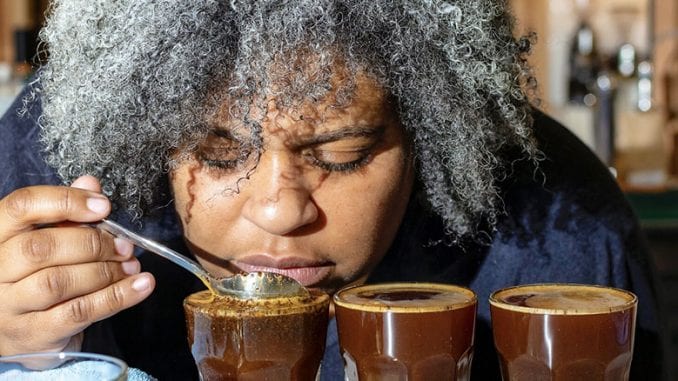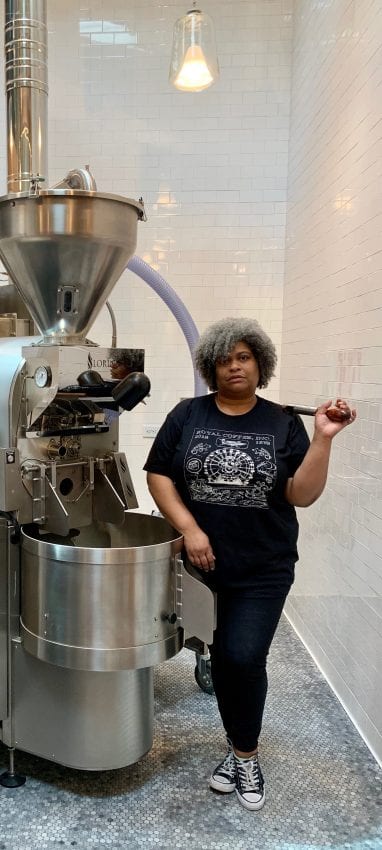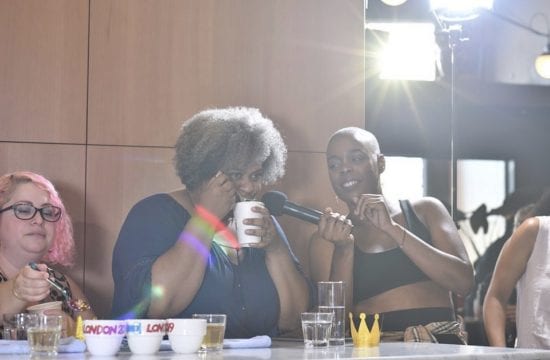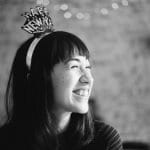
We chat with longtime coffee roaster and green buyer Candice Madison about the many industries within coffee and how marginalized voices can be heard.
BY KATRINA YENTCH
BARISTA MAGAZINE ONLINE
Cover photo courtesy of Evan Gilman
After nearly 10 years in the coffee industry, Candice Madison always stays busy. Candice started her career as a London barista and eventually worked her way toward becoming an operations powerhouse, diving into a variety of roasting, quality-control, and green-buying positions throughout the United Kingdom—this alongside her countless times judging U.S. and World Barista Championship events.
Today, Candice is based in Oakland, Calif., where she works as director of roasting for The Crown at Royal Coffee Lab. Candice also regularly takes part in events and initiatives in the coffee world, from speaking at Black Coffee NYC and the Re:co Symposium to serving on the SCA’s Equity, Diversity, & Inclusion Task Force. This list only skims the many places where Candice has been and is going; we got a chance to talk with her more in-depth about her never-ending desire to grow more in this industry, and how we can build more diverse teams of management within it.
Candice Madison is also featured in the latest August + September 2019 issue of Barista Magazine in the article “How to Come Back From Failure,” which you can read here.

Katrina Yentch: You’ve had a wide variety of coffee jobs throughout your time in the industry. What has been your favorite one and why?
Candice Madison: That’s a really difficult question. I think my favorite one to date is Notes Coffee Roasters, not negating other experiences I had. (Cofounder) Fabio Ferreira is an incredibly good match for me, and manager for me, and we fell into step. He was very hands-off; he trusted me from the beginning.
I roasted (at Notes) for a year and a half, on a Loring. He’s been that way since I first worked for him at Flat Cap Cart. And he was like, “You wanna do this or that? Your milk is bad.” That freedom and letting me off my chain helped reinforce my own sense of confidence, and my own sense of letting me know I have my own skill set I didn’t realize I had in coffee and beyond. We worked very collaboratively. We worked equally. He would bring in coffees to buy, (and with) some of them I was allowed to have a 50% say in what we purchased. I was supposed to be the production roaster so I think that allowed me to really settle in and bend down into my natural state, which is to be curious and exploring and tinker and tweak until they’re right. They’ve helped me quickly come into a quick (rhythm) with this (current) job of multiple roasters.
Why are you working in coffee right now? What’s most exciting/interesting about it that keeps you invested in the industry?
It’s funny, I’m old school. Once you see that career, it’s a career. I’d always been looking for a career because that’s what I knew you worked for to become an expert in your field. I don’t have any intention of leaving coffee. It’s always the same reason, the fact that it’s not one industry. It’s a huge amount of specialized work going into one project. It’s an incredibly diverse melange of industries. I work in coffee but I’m not an importer. I’m not a farmer or mill owner. These are specialized teams I can be a part of and be able to experience and interact with them more intimately. Unless I concentrate on that facet, it’s just fascinating—a multi-spoke wheel. My analogy always is, you don’t walk into Tiffany’s and ask for multi-sourced diamonds that have taken hundreds of hours to produce. You either afford it or you can’t. Coffee is not too expensive.
It’s curiosity that will always keep me involved. People have different thoughts, values, and ideas. I went to Ethiopia for the first time with Sam (Demisse) from Keffa Coffee. Sam was an incredible host. Being able to experience that with a person who had an intimate knowledge of someone from that country, that was invaluable.

What are some of your favorite cities for coffee outside of the States?
Copenhagen, Oslo, London … just for the experience of drinking coffee there? Manila. I drank liberica there for the first time … not for me. It’s not the range of flavor, a little more bitter. There’s multiple species of coffee.
Do you have any long-term goals you’ve set for yourself in this industry?
Yeah, kind of tangential to coffee. I started my sensory science post-grad diploma at the University of Nottingham. They asked if I wanted to join their panel. I did not because joining an actual sensory panel is very demanding. They calibrate you constantly. What was interesting was to be studying this at a high level, when you’re getting into sensory status at that level. I was interested in panel psychology because they work like crowds. I have often thought that there are different avenues I would take—(such as) a Ph.D. in panel evaluation as it lends itself to coffee analysis. I also have a disgusting amount of very expensive cookware. I’m hoping to take my general sommelier license next year and I would like to open a one-table kind of curated farm-to-table concept, coffee and wine. I (also) took a honey-tasting class to get a honey-tasting certificate.
What advice would you give to POC and marginalized voices trying to move into management in coffee?
First things first, I don’t give advice. The only thing to do with good advice is pass it on. The short answer is it’s very difficult. I came from a wealthy background. It was imbued in me from a very young age how to do cover letters, be authoritative, and navigate very difficult situations. And even those didn’t help me in implicit bias. I learned how to defend myself from that but those aren’t skills that everyone learns. I think the advice would be to know your sh*t. I’m not respected because I’m a black woman. I’m respected because I know my sh*t. To recognize that knowing your sh*t will not always get you the job. To make sure as a person of color that you are practicing self-care as diligently as you’re practicing your skills. We are the people who need it the most because we’re the people who the world sh*ts on the most. I think it’s important to keep your eyes open and see how your colleagues are working. If they’re not promoting, then leave. If you keep bagging on like that, it’s not going to work, then move on. Know when to get out, to respect yourself. Having respect for yourself and for others and for your skills is really important.

